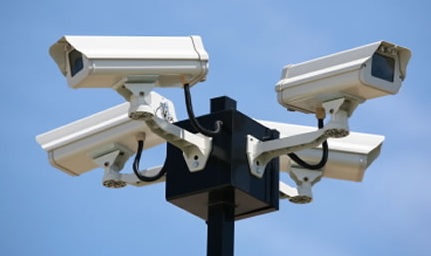A political battle over government mandates was ignited this week when Clinton Township in Macomb County required the installation of security cameras — at the owner’s expense — at businesses deemed vulnerable to crime.
The ordinance, the first of its kind in Michigan, took effect on Saturday and it quickly raised some eyebrows in Lansing.
State Rep. Klint Kesto (R-Wixom), chair of the House Justice Committee, said in a TV interview that mandating private businesses to pay for surveillance cameras is an improper “Big Brother” approach to government.

Cannon
“Our goal is the safety of businesses, their customers and our first responders,” township Supervisor Bob Cannon, a fellow Republican, told The Macomb Daily.
The requirement applies to banks, gas stations, hotels and motels, pharmacies, pawnbrokers, coin dealers and party stores selling alcohol. About 75 percent of businesses in that category – those that are most frequently in contact with the police – already have surveillance equipment. The ordinance mandates cameras inside and outside the premises.
With the township police department leading the way, the new rule was unanimously adopted by the township board. Business owners have six months to comply.
Beyond the pioneering approach, the ordinance is also significant because Clinton Township is the largest township in Michigan, with a population of about 100,000.
Comcast says it can install the necessary cameras for about $1,000, depending on the size of the store, followed by $140 monthly service fees. Cannon said that he believes most proprietors will pay less than that.
Cannon and Kesto debated the pros and cons of the ordinance on the weekend edition of Fox2 Detroit’s “Let It Rip.” The representative, a former prosecutor who may be a 2018 candidate for state attorney general, said he especially objects to the penalty for noncompliance – a fine of $150 per day.
Cannon said businesses must comply with numerous local ordinances and they will benefit under the new rule from a safer, surveilled environment. The longtime supervisor alerted Kesto that the concept may soon be coming to his Oakland County district, as West Bloomfield Township is expected to consider a similar ordinance.

Kesto
In Detroit, an initiative called Project Green Light encourages, but does not mandate, security cameras for shop owners. The project is credited with a significant drop in crime where cameras have been added.
The Clinton Township requirement was first proposed by police Capt. Rich Maierle, who noted that two recent cases of robberies where liquor store owners were fatally shot were quickly solved due to video camera evidence. But a bank robbery earlier this year failed to produce arrests because the bank had no outdoor surveillance equipment.
“A camera outside of the bank would have provided the getaway vehicle,” Maierle explained to the Daily. “Facts can get distorted; videos can’t lie.”
Besides generating controversy, the ordinance has generated competition among companies that install security cameras.
In a March 31 press release, EntirelyBiz, a Clinton Township firm that sells and installs business security systems, announced that it is offering “heavily discounted pricing” for township businesses facing the 6-month deadline.
“We’re located in the heart of Clinton Township and want to support local businesses and the Clinton Township police department in this important initiative,” CEO Michael Meldrum said in a statement. “We feel it’s our civic duty to step up and help local businesses.”



